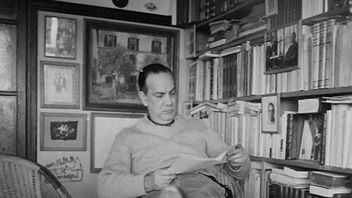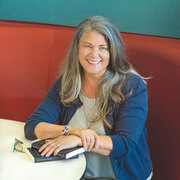 I am still jet-lagged after flying home to Sacramento from Madrid via London then Seattle. Way too many hours in airports and cramped seats. But no complaints. The trip, returning to Spain after nearly forty years, plus the opportunity to spend time with my daughters, was amazing. And, it's good to be home with my fingers on the computer keys after nearly a month's absence -- my longest separation in recent memory, at least several years, since retirement and returning to a daily writing practice. No complaints there either. I am trusting that the time away from directed, goal-driven writing will prove rejuvenating. And if not, well, it was a great trip. I did scribble notes in a flimsy notebook I brought along on the journey, so flimsy it's now taped at the seams to keep the pages from falling out. Random thoughts, images and memories evoked by returning to a city where I lived for close to a year not long after college, with my best friend (later first husband). He chose Madrid as our destination, because he was familiar with the city from spending his junior year at the university there and because we were both Spanish Literature majors in undergrad and reasonably proficient Spanish speakers. We shared lofty goals of writing (and publishing) novels and starting an international literary journal. The words were never spoken, but I imagine we both harbored fantasies of following in Hemingway's and other renowned ex-pat writers' footsteps. I know I was sustained by images of impressed family and friends as I returned to rave reviews for the touching, well-crafted coming-of-age saga I was sure I would crank out in a matter of months, after which it would be snatched up by an eager editor and consumed by leagues of enthralled readers. A novel was written that year. It remains, mercifully, unpublished, tucked away in a drawer in my office. The literary journal never came to fruition, or even close. The year proved humbling. In typical stubborn, dogged fashion, I am still (nearly 40 years later) coming to grips with the disappointment of not proving to be a literary wunderkind. If time has taught me anything, it's that I gave up too soon. And also this, it's never too late to begin again. Just write. That's all. Minimal tools required. The rest is out of my control. It was 1977 when I last visited Spain, not long after the death of longtime dictator Francisco Franco. With money saved from working for two years after graduating college, Rick and I rented a tiny studio apartment on the sixth floor of a building without an elevator. We bought a used typewriter at the Rastro - Madrid's massive Sunday flea market - reams of paper, a desk and a chair, and we set to work, clacking away on the keys for hours on end, driving our white-haired, stoop-shouldered neighbor mad, interrupting her enjoyment of telenovelas with our incessant racket, bursts of manic typing interspersed with reading out loud to one another, emotive eruptions and pacing the cheap linoleum (him) and tears (me) as we edited one another's work and struggled to articulate our many artistic differences of opinion. It seems like a long time ago and also like yesterday. 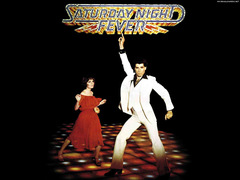 Madrid post-Franco was a city alive, frenetic, the streets an outward explosion of suppressed energy as the populace explored newfound freedoms and the influences of outside cultures flooded in (fast food franchises, American films and music, porno mags at every corner news kiosk). I was enthralled, mesmerized, by a massive billboard for the film Saturday Night Fever. An impossibly slim-hipped John Travolta in a vested white suit, one finger stabbing the sky in a defiant disco stance. While Madrid burst at its ancient, cobbled seams, buzzing and dancing around us, Rick and I were holed up in our tiny attic, clicking the keys, scribbling in notepads, emerging to buy the cheapest of foods for our evening meals - potatoes, onions, a nubbin of cheese - rewarding ourselves with the occasional visit to a cafe, park or museum. The cultural revolution that was happening all around, was lost on us. 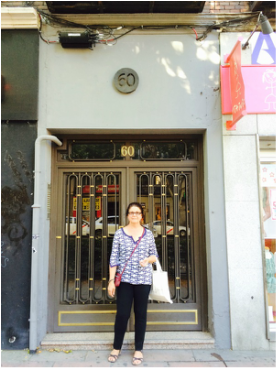 The narrow apartment building where we lived is still there on the Avenida de la Princesa. My younger daughter and I found it after a short ride on the Metro. The apartment and the busy commercial street were much as I remembered. Yet different. As photographs inevitably tell me I am too. I peered through the metal doors at the double row of mailboxes in the foyer, where I once waited hopefully for letters and the rare package from home. I imagine most, if not all, of the residents who lived there in the 70s are now gone - our neighbor was old even then, as was the frowsy woman in head-to-toe black who swept the endless stairs each day and picked up the trash we left just outside our door. I could hear her pause, breathing heavily on the topmost landing as she caught her breath after the climb and always imagined she peered through our keyhole, a bleary eyeball pressed to the slot. As the days in Madrid passed, the language returned to me in ways I hadn't expected or hoped for. I found myself thinking and writing in a jumble of intermixed Spanish and English. I was reminded of the heady sensation of discovering other sides of my personality, of losing the shackles of my English-speaking self. Every language has its own rhythm and cadence. There is a freedom in occupying a different linguistic self for a time, or in alternating between multiple selves. Sight-seeing in the city, my daughter and I chanced on an exhibit at the National Library commemorating the life of a writer I'd never heard of. Camilo Jose Cela (1916 - 2002). Cela was a prolific and accomplished novelist, short story writer and essayist, a Nobel Laureate for literature in 1989. He received the Nobel for his "rich and intensive prose, which with restrained compassion forms a challenging vision of man's vulnerability." Cela is also credited by some critics with having established the narrative style known as tremendismo, a tendency to emphasize violence and grotesque imagery. Considered crude and overly erotic, his work was banned in Spain during the Franco years. 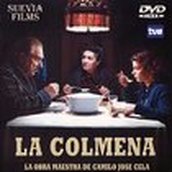 I bought his second novel, La Colmena (The Hive, 1951), an innovative and perceptive story of post Spanish civil war Madrid, set in a cafe. I'm working my way through it, laboriously. Cela is not what I would call an easy writer. The cast of characters is huge (over 300) and the chronology fragmented. The book was made into a 1982 movie, directed by Mario Camus. Cela has a small part in the film. The notion of Madrid as a hive resonates. I remember imagining it was a disrupted anthill, in the moments after some calamity, when the ants all pour out from underground, creating a black, moving carpet with their bodies. 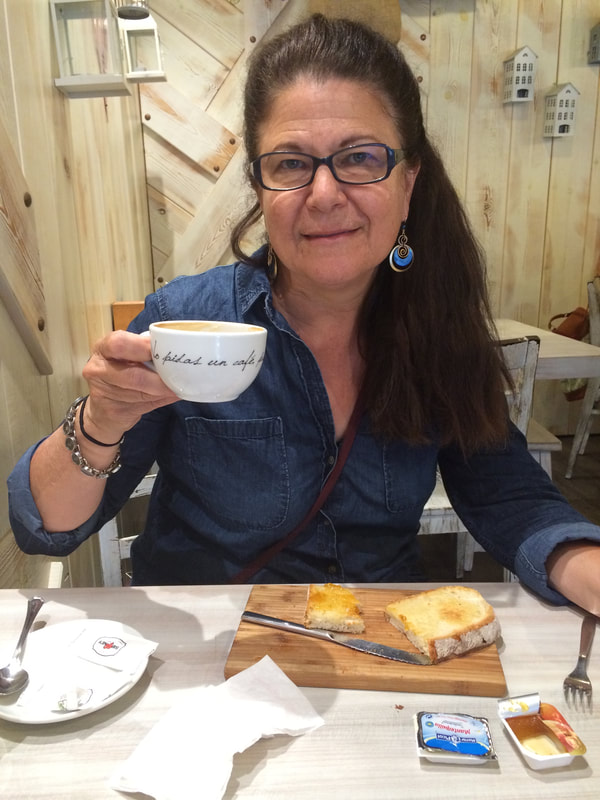 Chancing upon Cela and his work was a good reminder of an obvious truth. It is easy to imagine that the world is what we know. Yet, inevitably, we can only know what we know, what we are aware of and exposed to by the happenstance of our birth, which is only, ever, a tiny slice of the all. Every country, language, culture and people has its heroes and personalities, its stories, its artists and writers, their accomplishments unknown to most of the world. As many have said more eloquently than I, that is the reason to travel, and to read abundantly. Writers write to make sense of the world, to put words to the experience of living, of what it is to be human at a particular place and time. My prior visit to the great city of Madrid was a long time ago, yet the hopes and dreams of my twenty-four year old self haven't changed all that much. I still want to write, more than anything else, egotistical and self-centric as that may be. Like Cela, and countless others, "in reality, I live to write." It's what I choose to do and I am fortunate to have the time and freedom to do so. I have no expectation of returning home anything but what I am. A woman who chooses to write, to express experience and emotion with words on a page. That is all. It is not difficult to write in Spanish; the Spanish language is a gift from the gods which we Spaniards take for granted. I take comfort therefore in the belief that you wished to pay tribute to a glorious language and not to the humble writer who uses it for everything it can express: the joy and the wisdom of Mankind, since literature is an art form of all and for all, although written without deference, heeding only the voiceless, anonymous murmur of a given place and time.
9 Comments
|
Dorothy, author of GRAY IS THE NEW BLACK, blogs about the challenges and opportunities of being a woman and a writer of a certain age in a youth-centric universe.
categories
All
archives
July 2024
|
